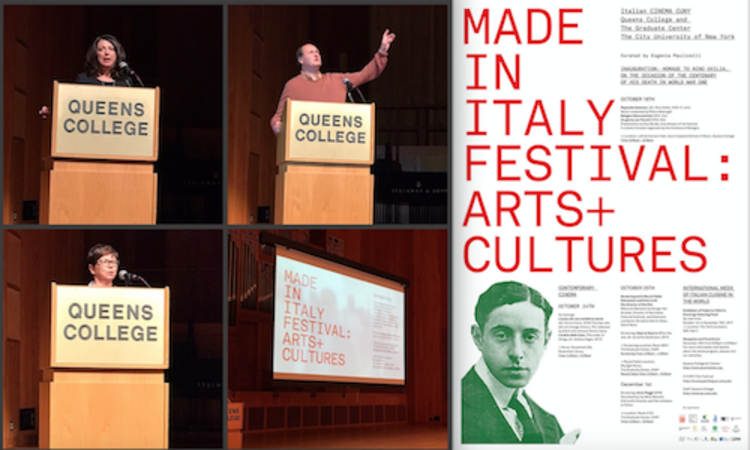


The launch of Italian Cinema–CUNY (IC–CUNY) [2] runs parallel with the International Week of the Italian language in the World, this year dedicated to cinema. The inaugural event at CUNY focused on the commemoration of the 100th anniversary of the death of Nino Oxilia, the Turin-born playwright, screenwriter, and film director who directed the 1915-1917 silent film masterpiece Rapsodia Satanica (Satanic Rhapsody). Oxilia died on the front during WWI at the age of 26. Queens College and CUNY welcomed Guy Borlèe, coordinator of Il Cinema Ritrovato, the annual international film festival organized by the Cineteca di Bologna [3].
Earlier in the day, Borlée had given a class to students from the Italian Program and the Freshmen Year Initiative (FYI) about several Cineteca projects, the process of restoring Italian and non Italian films and the many educational events they organize throughout the year. The Cineteca also partners with different foundations for the preservation of world cinema cultural heritage. Borlée also showed pictures of the past editions of the Cinema Ritrovato festival that often take place in beautiful sites of the city of Bologna, like Piazza Maggiore, and of some of the most important guests who come to the festival, including the director Nanni Moretti, who was also in NY at the Italian Cultural Institute a few days ago, the photographer Bruce Weber, Marco Bellocchio and Bernardo Bertolucci.
In the beautiful LeFrak concert hall in the Copland school of music at Queens College Oxilia’s masterpiece was screened in a fully restored version with original score written by Pietro Mascagni. Two short films--Bologna monumentale (1905) and Una giornata con Puccini (1915)--were also screened. These short films are part of a collection now available on DVD called The Grand Tour.
This interesting collection includes short films on Italian cities of the 1910s and documents the architecture, scenery and even ruins, as in the case of the city of Messina filmed after the 1908 earthquake. In her opening remarks, Dr.ssa Annavaleria Guazzieri, Director of Education at the Italian Consulate in NY, graciously welcomed initiatives that open up the study of Italian language and culture in a truly interdisciplinary setting. Cinema, she said, offers a great opportunity and over the last few days the city of New York has excelled in the celebration of the Italian culture.
Following the screening, the discussion was led by Guy Borlée and Eugenia Paulicelli who contextualized the films while explaining the role of Italian cinema in the world at this time, as well as the innovative figure of a diva such as Lyda Borelli. In Oxilia’s film, Borelli plays Alba who makes a pact with the devil in order to stay young for ever provided she renounces love.
This proved to be impossible and in an unforgettable sequence wearing Mariano Fortuny’s iconic pleated Delpho gown and a veil she walks towards death. Interestingly enough Lyda Borelli proved to be a link with the Fabric of Cultures exhibition at the Art Center where a dress inspired by the Tanagra statuette designed by Rosa Genoni, the fashion creator, feminist, and peace activist, in 1908 is shown. The dress was revolutionary, prized for its less restrictive style, fluidity, and draping. Borelli wore this dress in 1908 when she performed on stage at the Olympia Theatre in Milan (Paul Gavault, Il Matrimonio di Giacomina) and in the same year published a photo of her wearing the dress in the periodical L’Illustrazione italiana.
Here the iconic beauty and cultural cachet of Lyda Borelli advocate for the excellence of Italian Fashion at the time when Parisian fashion dominated the world scene. Rosa Genoni was using similar marketing ploys as Paul Poiret was doing in France. CUNY student Christina Trupiano has re-created the Tanagra dress for the exhibition, where it is on display; a video was made by Massimo Mascolo and Claudio Napoli (OKOZOKO) that captures the cinematic quality of the dress’s draping and fluidity. Borlèe mentioned, in fact, that no better film from the silent era could represent the opening of a “Made in Italy festival.” This is cinema that shows Made in Italy at its best.
Contemporary film will conclude the Festival
Screenings of contemporary Italian films in Italian with English subtitles are coming this week. Among the titles are L’uomo che non cambiò la storia (The man who did not change history, dir. Enrico Caria, 2015); L’ordine delle cose (The order of Things, dir. Andrea Segre, 2017, presented at the Venice latest film festival) Dopo la Guerra (After the War – by Annarita Zambrano, 2017) and Anna Piaggi – by Alina Marazzi, 2016). The directors Enrico Caria, Annarita Zambrano and Alina Marazzi (Dec. 1) will be present for post-film roundtable discussions with film scholars (Giancarlo Lombardi, David Ward, Nicoletta Marini Maio, Eugenia Paulicelli, Antonio Falduto).
Eugenia Paulicelli, the curator of the festival, has gratefully acknowledged support for Italian Cinema-CUNY from the Department of European Languages and Literatures, the Italian Program, the Department of History, the Freshmen Year Initiative (FYI) and the Office of the Dean of Arts and Humanities at Queens College, and the Office of the Provost at Queens College, and from the Program of Comparative Literatures, the Italian Specialization and the Office of the Provost at the Graduate Center of the City University of New York (CUNY). The festival enjoys the patronage of The Cineteca di Bologna, The City of Turin, The Museo del Cinema di Torino, and is presented in collaboration with Controluce, Wellesley College, the Regione Emilia Romagna, and Casa Artusi.
For more information and details about the whole program, please visits:
Queens College Art Center: http://www.artcenter.org [4];
IC CUNY Film Festival: http://iccuny.qwriting.qc.cuny.edu [5]
CUNY Queens College: http://www.qc.cuny.edu [6]
Source URL: http://newsite.iitaly.org/magazine/focus/art-culture/article/art-italian-cinema-its-origins-present
Links
[1] http://newsite.iitaly.org/files/filmfestivalic-cunycoverpng
[2] https://www.gc.cuny.edu/Page-Elements/Academics-Research-Centers-Initiatives/Doctoral-Programs/Comparative-Literature/Made-in-Italy-Festival-Arts-Cultures
[3] http://www.cinetecadibologna.it/
[4] http://www.artcenter.org
[5] http://iccuny.qwriting.qc.cuny.edu
[6] http://www.qc.cuny.edu